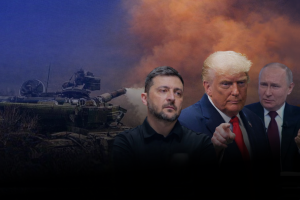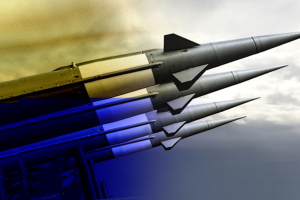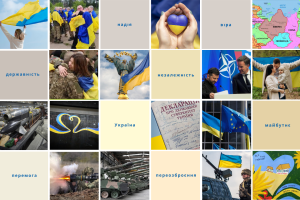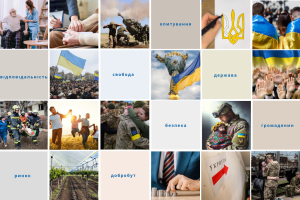This nationwide study was conducted by the Ilko Kucheriv Democratic Initiatives Foundation jointly with the Razumkov Center sociological service on December 17-22, 2021 in all regions of Ukraine excluding the Crimea and occupied parts of Donetsk and Luhansk regions. Exactly 2,018 respondents aged 18 years and older were polled. The theoretical sampling error is 2.3%.
Politician of the Year and Disappointment of the Year, Person of the Year and Meme of the Year
- Ukrainian President Volodymyr Zelensky for the second consecutive year tops the “Politician of the Year” and “Disappointment of the Year” ratings. Indeed, there is a noticeable rise in both cases of the indicators. This year, 17% named V. Zelenskyy “Politician of the Year” whereas in 2020, 14.8% indicated the same. On the other hand, 45% of those polled named V. Zelenskyy the “Disappointment of the year,” whereas in the previous year, 28% deemed him the “Loser of the Year”.
- Second place for the nomination of “Politician of the Year” is split between ex-President Petro Poroshenko (8.1%) and former parliamentary speaker of the Verkhovna Rada Dmytro Razumkov (8%). In the “Disappointment of the Year” category, European Solidarity party leader Petro Poroshenko was named most often (8.5%) than Dmytro Razumkov (3%), who formerly headed the party list of Servant of the People. Nearly 15% of those polled said there was nobody to name as the politician of the year and almost 20% hesitated to respond, while 5% wouldn’t provide an answer to this open-ended question.
- Making the list among those who received more than 1% of mentions for both “Politician of the Year” and “Disappointment of the Year” were: Yulia Tymoshenko – 4.4% and 1.5%, respectively; Viktor Medvedchuk – 1.2% and 3.2%, respectively. Kyiv Mayor Vitaliy Klitschko was nominated in both categories by 1.1% of the respondents.
- Among the politicians mentioned only as "Politicians of the Year" were: Yuri Boyko - 3.7%, Yevhen Murayev - 3.4%, Ihor Smeshko - 1.8%, Volodymyr Hroysman - 1.4%, and Serhiy Prytula - 1%.
- And only as the “Disappointment of the Year”, respondents named: Mykola Tyshchenko (1.2%), Illya Kyva (1.2%), and Prime Minister Denys Shmyhal (1.1%). Another 3% of respondents said that all politicians disappointed them and 1.3% of those polled said they couldn’t name anyone who disappointed them, while 15% were hesitant in their response and 4% refused to answer this open-ended question.
.png)
- We additionally this year asked Ukrainians whom would they call the “Symbol of 2021”, or the Person of the Year. Answering this open-ended question, 8.5% of respondents named Volodymyr Zelenskyy Person of the Year. Second place was split between Petro Poroshenko (3.6%), Dmytro Razumkov (3.3%, Angela Merkel (3.1%) and Elon Musk (3%). An honorary “bronze” medal went to Joe Biden (2.7%). Among those who were mentioned by more than 1% of respondents were also: Yulia Tymoshenko (1.8%), Dmytro Hordon (1.3%), Yevheniy Murayev (1.2%), Oleksandr Usyk (1.2%), Volodymyr Putin (1.1%), Serhiy Prytula (1%), and medical workers/doctors (1%). There were no such “authority” figures for 11.3% of the respondents, and 31.1% could not provide an answer, while 7.1% refused to provide an answer to this open-ended question.
.png)
- We also asked Ukrainians if they remember any funny or amusing event that happened to famous people that could be considered the meme of 2021. Thus, 5.2% of those polled called the “Volodymyr Zelenskyy press conference” the meme of the year, and another 3.4% named Volodymyr Zelenskyy himself. Each getting 2.6% mentions were city manager Vitaliy Klitschko and national lawmaker Mykola Tyshchenko, in particular, for his statements “on food prices.” Almost the same amount at 2.5% of respondents said the meme goes to “1,000 hryvnias from Zelenskyy,” and 2.1% of respondents said Illya Kyva made them laugh, particularly as “Kyva the Researcher”. Finding it difficult to respond to this open-ended question were 47.2% of respondents, 3% assured that such events did not take place, and almost 14% did not wish to provide an answer.
.png)
The Event of 2021 in Ukraine and the World
- If in the previous year of 2020, the majority of respondents called the coronavirus pandemic the main event in Ukraine, this year with much less results for this title lay "claim" as many as three events: in addition to the coronavirus pandemic (6.5%), respondents named the 30th anniversary of independence (6.3%) and vaccination against the coronavirus (5.9%). It is worth noting that this year the respondents had to answer an open-ended question, while in 2020 they chose from a proposed list of events.
- The dismissal of Dmytro Razumkov as Speaker of the Verkhovna Rada of Ukraine was mentioned by 4.4% of those polled; “Wagnergate” was named as the event of the year in Ukraine by 3.8%, and 3.7% believe it was the “agricultural land law.”
- The threat of Russia invading as the event of the year in Ukraine was named by 3% of those polled, and another 2.8% named war as the main event. We will point out that in 2020, among the options on the list offered for choosing, the war in the Donbas was named the event of the year by 12.2% of those polled.
- The list of events mentioned by more than 1% of respondents included: the Crimean Platform Summit (1.7%), the Biden and Zelenskyy talks (1.7%), 1,000 hryvnias reward for vaccination (1.4%), “Big Construction” (1.4%), Zelenskyy’s press conference (1.3%), “Law on Oligarchs” (1.3%), Avakov’s resignation (1%), and road construction (1%). At the same time, 4.5% of respondents believe that there were no such events at all, 25.8% – could not answer the open-ended question, and 6.8% refused to answer at all.
.png)
- Among world events that could be considered as the “Event of the Year,” those polled named: the coronavirus pandemic (12.1%), election of a new Federal German chancellor (6.6%), events in Afghanistan, withdrawal of U.S. troops from Afghanistan (6.5%), talks between Putin and Biden (5.6%), the presidential election in the USA (4.8%), vaccination against the coronavirus (4.5%), the refugee situation on the Belarus-Poland border (2.5%), events in Belarus (1.9%), the threat of Russian invasion (1.6%), talks between Biden and Zelenskyy (1.2%), and war (1.1%). 26% of those polled found it difficult to answer this question, 2.4% indicated that were no such events, and 6.8% refused to answer this question.
.png)
Emotional Outcomes and Feelings about the Future
- Most Ukrainians stated they were happy in 2021. Thus, 7% said they were very happy and another 46% said they were mostly happy. Mostly unhappy were 27%, while 8% were completely unhappy. At the same time, the number of happy Ukrainians significantly dropped in comparison to the pre-pandemic year of 2019 when more than 60% said they were happy.
- Happiness lies not in money… but in its quantity ... The level of happiness correlates with material wealth: better off respondents were much more likely to say that they were happy during the year than poorer respondents. The same relationship exists for next year's expectations: the richer the respondents, the more often they expect the next year to be better.
- One-fifth of respondents in 2021 derived happiness from the significant success of their relatives, and 17% said they had significant success at work, study or creativity. Another 13% in 2021 made an interesting trip in Ukraine or abroad. Almost one in ten respondents said they overcame a serious or chronic illness within the year. At the same time, almost 29% of respondents said that no positive events in their lives transpired in 2021.
.png)
- In the past two years there were no real changes in the tradition of celebrating Christmas. An absolute majority (67%) celebrate it on January 7. Christmas on December 25 is observed by 3%, and 25% celebrate it twice.
- Ukrainians greet the 2022 New Year mainly with feelings of hope (43%) and anxiety (34%) with regard to the future of the state. Men were 6% more likely than women to mention such an emotion as optimism, while women were more likely than men to express fear (a 5% difference) and confusion (a difference of 7%) when thinking about the country's future. The age distribution of respondents shows that the younger the generation, the more optimism and hope this demographic voices compared to older age groups. Conversely, older generations are more likely than younger generations to experience hopelessness, confusion, pessimism, anxiety and fear.
.png)
- Despite their proximity to the war zone, the residents of the eastern macro-region of the country are the most optimistic about the future of Ukraine (31%). The gloomiest feelings are among residents of the south: 19% feel hopeless, 11% pessimistic, 44% anxiety, and 21% fear. These are the highest indicators compared to other parts of Ukraine.
- Starting in 2019, the trend of declining optimism, joy, confidence and hope is deepening among citizens when they think about the future of Ukraine is deepening. At the same time, there is a gradual increase in feelings of hopelessness, confusion, pessimism and fear.
Elections to Parliament
(electoral preferences of citizens (survey of 17-22.12.2021) regarding a presidential election is available at: https://dif.org.ua/article/otsinka-situatsii-v-kraini-ta-elektoralni-orientatsii-gromadyan-ukraini-na-prezidentskikh-viborakh )
- “Servant of the People” remains the leader among electoral preferences, although its advantage over other parties is small. Thus, 20.5% of respondents who say they are decided and intend to vote would choose the “servants”. Servant of the People is the only major political party that has relatively equal support in all regions and education groups. Among voters of this party, there also is no significant deviation regarding the financial condition of respondents or their language of communication. Of the features, “Servant of the People” dominates among young voters (aged up to 30 years) but as the age of the respondent grows, its support decreases.
- In second place with 17% of support comes the European Solidarity party. Voters with a higher education support it the most, and, as a rule, people who are better-off. Most of ES’s voters reside in the west, and partly in the center.
- Third place among electoral preferences is split between three parties. Batkivshchyna (Fatherland) (10.5%), the potential party of Rozumna Polityka (Reasonable Policy) (10.5%) and Opposition Platform for Life (10%). Older respondents and the less well-off tend to vote for Batkivshchyna and OPfL. However, there are many differences. Respondents with a lower education level are much more likely to vote for OPfL (which is not the case with Batkivshchyna). The structure of Batkivshchyna's voters, in turn, is totally dominated by women, which is not the case with other parties. As for the voters of Rozumna Polityka (Reasonable Politics), it is difficult to say anything definite about them at the moment. It seems that these voters are not structurally different from those who vote for the Servant of the People, except for the older age of the "servants" voters.
- Chances to be voted into parliament also have the Syla i Chest (Strength and Honor) party and Nashi (Ours) project. The former can potentially garner almost 7% and the latter just above 5%. The Ukrainian Strategy of Hroysman party is quite close to the election threshold with 4.4% backing.
.png)
.png)
- Assuming that the elections were conducted in such a scenario and in a proportional electoral system with one single-mandate constituency, the political factions would face the problem of forming a coalition. The minimum number of coalition partners would be three, and the options for such coalitions could vary greatly.
)%D0%BE%D0%BD%D0%BE%D0%B2%D0%BB.png)
.png)
Download DOC








